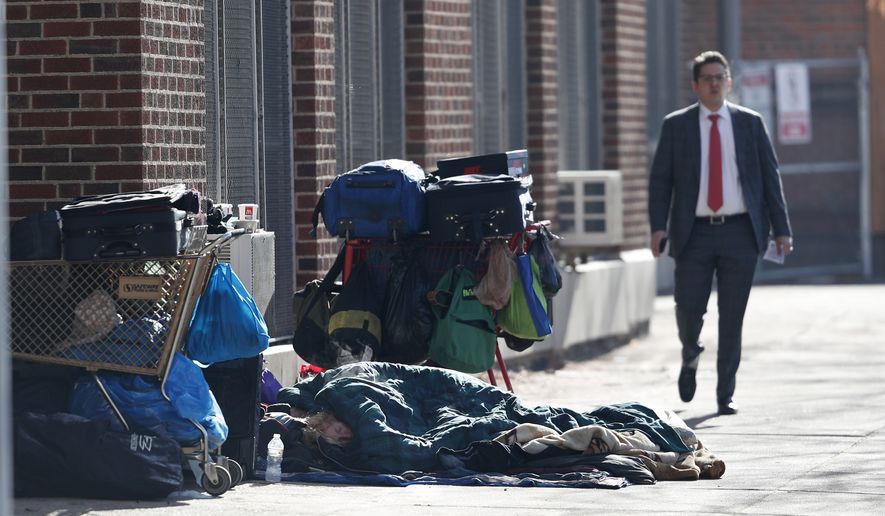Denver authorities routinely clear out the homeless encampments that crop up in public parks and along sidewalks within the city limits, but that would change under Initiative 300.
The measure on Tuesday’s ballot would allow the homeless — and anyone else — to live, eat and sleep in public places in a “non-obstructive manner,” overturning the city’s 2012 camping ban and other ordinances that interfere with what the Yes on 300/Right to Survive campaign calls “the right to rest.”
“I am so tired. I just want to sleep, that’s all I want to do,” says a distraught woman in a Yes on 300 campaign ad. “And I can’t sleep no matter where I go. I’m tired of rolling my bags, so tired of all of it. I just want to sleep.”
Similar proposals have been floated in the California, Colorado, Oregon and Washington state legislatures, but opponents say Denver would become the first major jurisdiction to give its blessing to such a policy, raising fears that the Mile High tent cities would soon rival those of Los Angeles and Seattle.
“Seattle, Los Angeles, Portland, as far as we know have seen the rise of these encampments because of either the lack of enforcement or legal challenges to camping bans and other ordinances that allow city officials to move people along,” said Cody Belzley, policy director of Together Denver/No on 30.
“If Denver were to pass this, we would be the first to implement a policy that expressly gives people a right to give people a right to use public property in this way,” Ms. Belzley said.
Fighting the initiative is a high-powered coalition of business, conservation and neighborhood groups, which argue that the policy would put the environment and public health at risk by allowing permanent encampments while providing no additional services or funding for homelessness.
“We all agree that people experiencing homelessness have a right to live in Denver,” said Mike Kopp, president and CEO of the pro-business Colorado Concern, in a statement. “That doesn’t mean we should turn Denver’s parks and sidewalks into homeless camps.”
So far that argument appears to be making headway. An internal Together Denver poll obtained last week by CBS4 showed the initiative losing by 61% to 32%, the polar opposite of a March survey showing the measure ahead by 56% to 33%.
Supporters cite the funding discrepancy — the pro-300 campaign has been outspent by more than 10 to 1 — as well as “false and misleading scare tactics,” as the ACLU of Colorado put it.
The measure has divided the left. Leading the pro-300 fight are the ACLU, the Denver Democratic Party and Occupy Denver — whose protest encampments spurred the city council’s camping ban — while opponents include Mayor Michael Hancock and former Mayor Wellington Webb.
“The homeless need housing, shelter, medical treatment and other services,” said Mr. Webb in a statement. “The way to help the homeless is not to abandon their needs and open up our parks, church lots and other areas. That’s the wrong solution.”
Proponents have framed the debate as a human-rights issue, arguing that preventing those without homes from sleeping in public places is not only inhumane, but hampers those trying to get their lives back on track.
Policies like the camping ban “worsen the crisis by making homelessness harder to exit. Arrests, unaffordable tickets, and the collateral consequences of criminal convictions make it more difficult for people to get back on their feet,” said the National Law Center on Homelessness & Poverty, which has endorsed Initiative 300.
“Right now in Denver, people experiencing homelessness face a cruel trap: they can’t sleep on private property because that’s trespassing, and they can’t sleep on public property because of the Denver camping ban and other ordinances that criminalize homelessness,” said the ACLU of Colorado in a post. “So where are they supposed to go?”
How about a shelter? In a February study, the REMI Partnership counted about 5,300 homeless in the seven-county Denver metro area, and 6,376 shelter beds, but supporters argue that the facilities are inadequate.
The REMI study also found that Denver spends $50 million per year on services for the homeless and that private philanthropies contribute another $90 million.
Critics argue that not all shelters can accommodate, for example, families or those who work at night and sleep during the day. Shelters also ban recreational drug and alcohol use, and pushing the homeless from one end of town to another disrupts their ability to find jobs.
Homeless advocates are also split on the measure, which creates civil and criminal penalties for those who “harass, terrorize, threaten, or intimidate” the homeless — or anyone camping out in public places — and could discourage social service workers and first-responders from approaching them.
“The concern that it could have a chilling effect on service providers who are trying to work with anyone in a public place, whether or not they’re a person experiencing homelessness,” said Ms. Belzley.
The number of homeless in Denver has ticked up as newcomers flock to Colorado — it was the seventh fastest-growing state last year — and the housing market grows tighter and more expensive.
Right to Survive argued that the measure would put pressure on the city to stop sweeping the problem under the rug.
“A ’yes’ vote on 300 will not solve the problem of homelessness in Denver,” said the Right to Survive campaign. “But it is the first step toward a real solution, instead of the status quo — which we all know is not working.”
• Valerie Richardson can be reached at vrichardson@washingtontimes.com.




Please read our comment policy before commenting.